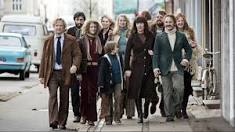From the Madding Crowd to the Commune
The Commune brings Danish director Thomas Vinterberg home, following his big-budget English language turn in Far From the Madding Crowd. This sensitively acted, loving tribute to his chaotic upbringing once again demonstrates Vinterberg’s mastery of the searing family drama. His film family includes Commune’s lead actress Trine Dyrholm (whose wrenching performance won her the Golden Bear at the Berlinale) and co-star Ulrich Thomsen. Both also worked with Vinterberg in his harrowing The Celebration.
Vinterberg’s fascination with complicated family dynamics can be traced to his childhood spent in a Copenhagen commune, aged seven to nineteen. He refers to it as “a crazy, affectionate, wonderful time for me, in the middle of naked people, beer, pretentious discussions, love and personal tragedies.”
Here we are back in the mid-1970s. Erik and Anna’s privileged lives are about to reach perfection. Erik, an architecture professor, inherits a villa in a posh section of Copenhagen. His wife Anna is a long-time news reader on state TV. Their quietly smiling teenage daughter Freja loves them both dearly. But Anna’s a bit bored. She suggests they embark on an adventure and throw their new home open to a few old friends – and a couple complete strangers – as an experiment in communal living. Erik is skeptical. He needs quiet for his work; he has a quick temper and little patience with fantasies. But Anna wins this argument. Swept away by the collective spirit of the time, the newly-formed band of ten unlikely roommates determines to fashion a new, open life.
Of course it’s a recipe for disaster. Some members of the commune are jobless and can’t pay rent; others bemoan the lack of rules. One alcoholic tidies up by burning the stuff that his housemates leave lying around. One by one, the members of the group become isolated. So much energy is put into maintaining the group that its individuals get lost. Freja misses her parents’ attention and starts sleeping with an older boy. Erik spends more time at work. But The Commune is more or less Anna’s story. In truly communal spirit, Erik brings a beautiful student home to live with them. Despite her dedication to the free way of life, emancipated Anna is absolutely torn up by jealousy. Yet Freja proves to be surprisingly emotionally stable, and she’s the one who calls out the commune for the dystopia it really is.
Freja might be Thomas Vinterberg’s counterpart in the story. “Maybe my memory is selective or romantic, but it feels warm and golden. Still, of course there were a lot of fights and sadness, and most of all, a lack of clarity. There was a lot of chaos in the relationships, that was the problem.” The Commune is classic Vinterberg, a search for clarity amidst the chaos.
Published in Cinema Scandinavia




